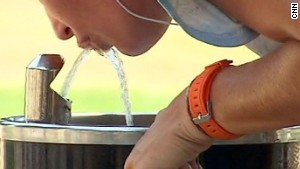| subject | 미국 CNN 보도, FDA 생수에 들어가는 불소의 함량을 낮추라고 결정 |
|---|---|
| writer | 관리자 |
| date | 19-04-04 12:41 |
| hit | 1,545 |
관련링크본문FDA proposes new fluoride standard for bottled water, but some say it's still too high 낮춘 수치도 여전히 높다고 말하는 과학자들: 불소는 충치에방 이슈뿐 아니라 부작용인 치아불소증, 뇌발달(IQ,ADHD등)과도 관련 되어있어 있어 주의가 요구된다. (CNN)The US Food and Drug Administration is proposing a lower concentration level standard for fluoride in bottled water, yet some scientists and environmental groups believe that the proposed limit is still too high and poses a danger to human health. If finalized, the new regulation will lower allowable levels of fluoride in domestically packaged and imported bottled water to 0.7 milligrams per liter, a slight reduction from the current standard range of between 0.8 and 1.7 milligrams per liter allowed by the FDA. The proposed standard would apply only to bottled water with added fluoride. It would not affect allowable levels of fluoride in bottled water that may contain fluoride from source water. Dental healthThe FDA's proposed rule aligns with a 2015 recommendation from the US Public Health Service, part of the US Department of Health and Human Services, that suggests 0.7 milligrams per liter is the optimal fluoride concentration for community water systems that add fluoride. The new rule "is based on findings from evolving research on optimal concentrations of fluoride that balances fluoride's benefits in preventing tooth decay with its risk of causing dental fluorosis, a condition most often characterized by white patches on teeth," the FDA said in its statement. Dental fluorosis is caused by taking in too much fluoride over a long period when adult teeth are forming under the gums. But some scientists' concerns extend far beyond fluorosis. "Given that fluoride can damage brain development, I would recommend that the maximum fluoride concentration in bottled water be kept at a lower level than 0.7 mg/L," Dr. Philippe Grandjean, an adjunct professor of environmental health at the Harvard TH Chan School of Public Health, wrote in an email. Christopher Neurath, research director of the American Environmental Health Studies Project, which is connected to the Flouride Action Network, an environmental advocacy group, said "currently, there are rapidly increasing scientific studies showing neurotoxicity to fluoride," with research showing a direct link between children's IQ and their level of fluoride exposure in the womb: "That is our largest concern." The American Dental Association noted that "science-based organizations," including itself and the American Academy of Pediatrics, "fully support the public health benefits of community water fluoridation." The association also noted that the newly proposed level helps prevent tooth decay, while not increasing the risk of dental fluorosis, which among Americans is primarily a cosmetic condition that doesn't affect the health or function of teeth. "Even with the availability of other sources of fluoride, community water fluoridation prevents tooth decay by at least 25% in both children and adults," the association said. Behavioral and cognitive health effectsMorteza Bashash, an assistant professor in the Dalla Lana School of Public Health at the University of Toronto, found that higher fluoride levels as measured in urine samples of pregnant women are associated with both lower IQ and increased risk of attention-deficit hyperactivity disorder among children in Mexico. Specifically, Bashash found a drop in children's scores on intelligence tests for every 0.5 milligram-per-liter increase in fluoride exposure beyond 0.8 milligrams per liter detected in a pregnant mother's urine. It is not clear whether this is research applicable to the US population, he said. In Mexico, for example, the government delivers cavity-reducing fluoride by adding it to salt, not water, as many people avoid drinking tap water. Still, his research findings were "based on the true measurement of fluoride absorbed in the body." And a Canadian study presented at a conference last year and studies conducted in China showed IQ losses as related to fluoride levels within a similar order of magnitude. Due to similar fluoride sources, regulations and diet, Canada's findings of urine levels are probably similar to those in America, Bashash said. Neurath trusts that both the Mexican and Canadian study results would generally apply to the United States because "urine fluoride is best measure of total fluoride intake." Canadian data from the past 15 years has shown that women living in cities with fluorinated water supplies had "almost double" urine fluoride concentrations levels as women living in non-fluorinated cities. "Drinking water fluoride is the major source of fluoride for these women," he said. The effect of prenatal exposure to fluoride on IQ is "very large," Neurath believes. "And on a population basis, that's very concerning." Proposed rule may not be adequateNeurath himself published a study of dental fluorosis this year, based on National Health and Nutrition Examination Survey data, that found a "dramatic increase in fluorosis" over results from a decade ago. (The study, though published in a peer-reviewed journal, is co-authored by an attorney representing the Fluoride Action Network in legal action regarding regulation of fluoridation chemicals by the US Environmental Protection Agency.) More than 30% of adolescents in the study showed moderate to severe dental fluorosis (an additional 35% of children showed lesser signs of the condition), "a huge increase" over a survey conducted about a decade prior, Neurath said. He believes that the proposed standard is unlikely to reduce dental fluorosis to acceptable levels. However, he has a bigger concern. "Dental fluorosis is a visible sign of overexposure to fluoride, but there are other nonvisible signs and adverse health effects that are much more serious," Neurath said based on the work of Bashash and Grandjean. Grandjean's work was funded by the National Institute of Environmental Health Sciences. "Our review of studies from China and our own field study is in accordance with a recent study by US researchers carried out in Mexico that elevated exposure to fluoride during pregnancy is associated with toxicity to brain development. "Given that fluoride is added to toothpaste to secure that the enamel surface of the teeth is properly protected against caries, there is no need to supplement the dietary fluoride intake," he said. Alternatively, Bashash said, fluoride in drinking water is considered one of the "biggest public health victories" in preventing cavities. While his job as a scientist is to study a given topic, It is the job of policymakers to come up with the overall understanding of what's necessary. The FDA looks "at the big picture" by gathering the evidence and evaluating the pros and cons based on national priorities. "This has been a hot topic for 60 years." Get CNN Health's weekly newsletter Sign up here to get The Results Are In with Dr. Sanjay Gupta every Tuesday from the CNN Health team. Linda Birnbaum, director of the National Institute of Environmental Health Sciences, explained that a "large, cross-government working group" looked at the data available in 2010 to 2011 and concluded that 0.7 milligrams per liter was the appropriate level of fluoride concentration in drinking water, one that "balances protection from dental caries while limiting the risk from dental fluorosis." The institute has funded studies that explore other health effects, she said, "and we are looking at the information in a systematic review now." The International Bottled Water Association, a trade group, said it supports the FDA proposal to revise the standard of quality for fluoride added to bottled water. "Most companies are well below" the newly proposed limit, according to Jill Culora, a spokeswoman for the association. "The proposed rule takes into account the many sources of fluoride in people's diets and will further reduce the risk of dental fluorosis, while still providing an optimal level of fluoride to help prevent tooth decay." Cavities are not the only concern, Neurath said: "The proposed rule is not adequate."
|
|
댓글목록
등록된 댓글이 없습니다.



